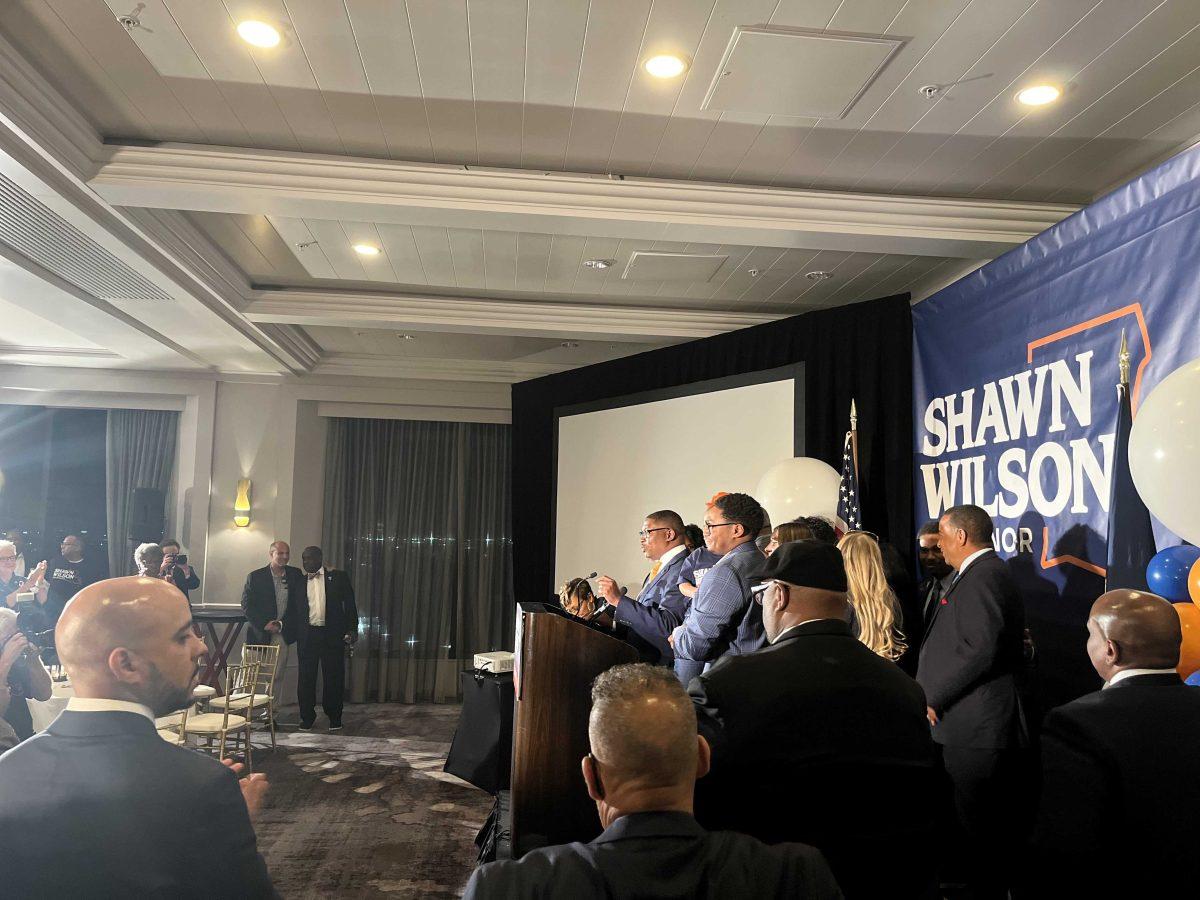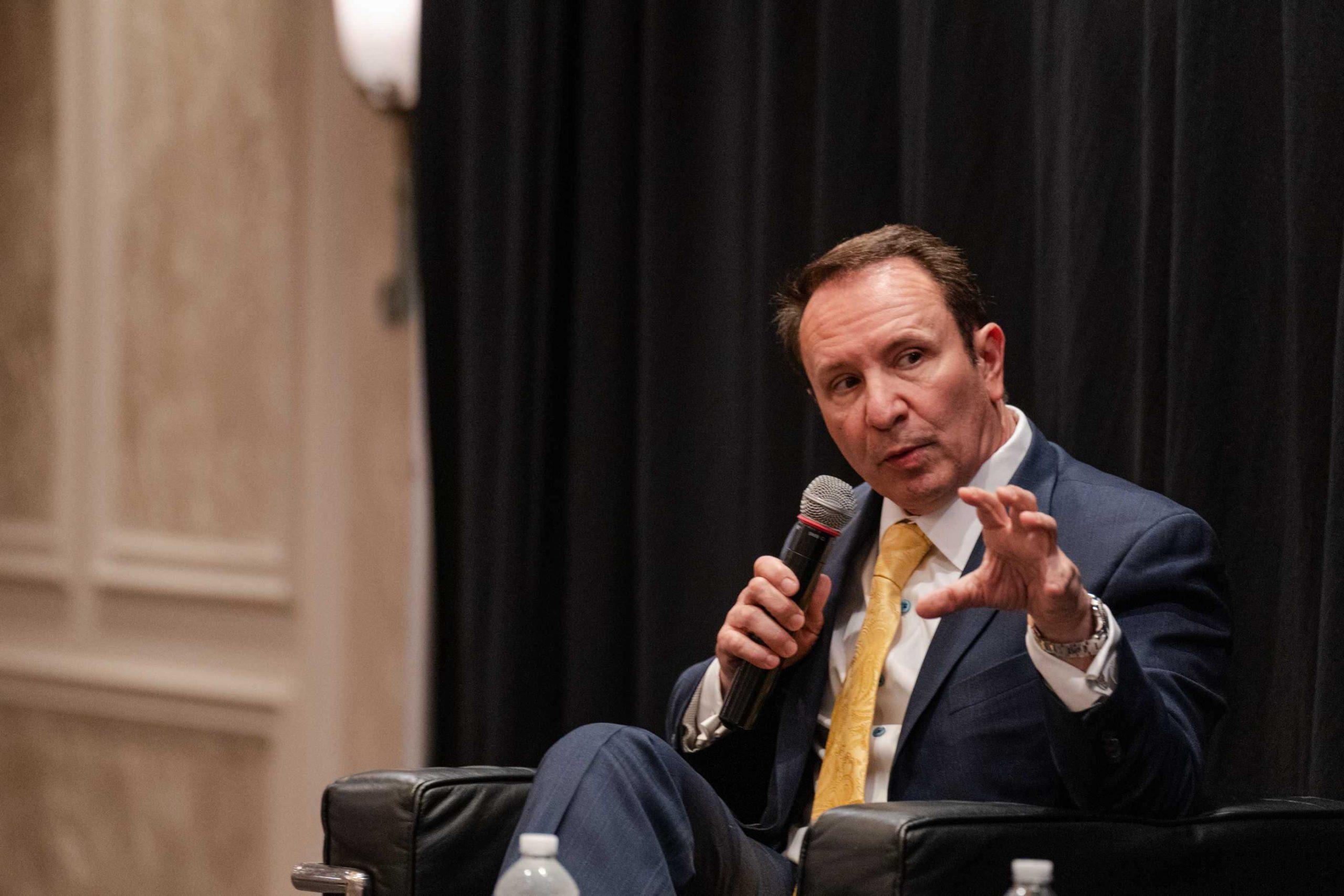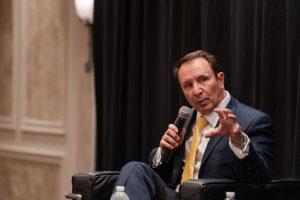Jeff Landry will be Louisiana’s 57th governor after beating out a crowded field of candidates in Saturday’s primary, exceeding expectations and avoiding a runoff election.
“This state is my family,” Landry, who has been the state’s attorney general since 2016, told a cheering crowd of supporters at his election night party in Broussard, where he was introduced as governor-elect. “And we are going to work to fix this state. Because you know why? Because that’s what families do.”
Landry secured 52% of the vote. The Associated Press called the race for the Trump-backed Republican at 10:15 p.m., around two hours after polls closed.
Republicans secured massive victories around Louisiana on election night and are likely to control all statewide offices. Republicans hold the state Legislature by wide margins and are poised to achieve supermajorities in the House and Senate — this time with a united executive branch.
Landry will replace Gov. John Bel Edwards, the lone Democratic governor in the Deep South, early next year. Edwards has used his veto as a stopping block against anti-LGBTQ+ legislation several times throughout his two terms.
Former Secretary of Transportation Shawn Wilson, a Democrat, trailed far behind in second place with 26%. The polls had projected Landry would come in under 50% in the primary, which would have forced a runoff between him and second-place Wilson.
Though Landry has been the frontrunner from the start, he exceeded expectations. Even those at Landry’s party at The Ballroom in Broussard — decorated with balloons in his yellow, blue and white campaign colors — were floored by the outright win.
After calling Landry to congratulate him, Wilson told supporters in New Orleans that the night might have ended differently if more people had voted.
Roughly a million votes were cast for governor, putting voter turnout around 35.8%, according to the latest unofficial results from the secretary of state. That’s 10 points lower than the state’s last gubernatorial primary in 2019.
“This was a low turnout election,” Wilson said. “It might have been different if there was another 150,000 people who had voted.”
Despite the loss, Wilson said he had no regrets.
“While we might not understand everything that Jeff Landry wants to do as governor, I believe he wants to try to do the right thing,” Wilson said.
Landry, 52, announced his run for governor last October. Several prominent Republicans — including U.S. Sen. Bill Cassidy, U.S. Rep. Garret Graves and Lt. Gov. Billy Nungesser — declined to run, clearing the field of most heavyweight opponents.
In a remarkably early move, the state Republican Party endorsed Landry the month after he announced his run and a year before election day, much to the chagrin of some members, including those still mulling a candidacy of their own.
He faced a crowded field of Republicans, along with Wilson and a conservative independent, but they ultimately posed little threat to Landry.
The other gubernatorial candidates earned only single-digit shares of the vote. Former business lobby head Stephen Waguespack came in a distant third at 6%, trailed by state Treasurer John Schroder and trial lawyer Hunter Lundy at 5% each.
State Sen. Sharon Hewitt of Slidell, who attended the debates and months of forums, rang in at 2%, behind Democrat Danny Cole, who didn’t attend those same candidate events.
Landry has been a loud, controversial figure in Louisiana politics. He is a Cajun from St. Martinville, a town 16 miles southeast of Lafayette with a population around 6,000.
He served in the Army National Guard for 11 years before earning a bachelor’s degree from the University of Louisiana at Lafayette and studying law at Loyola University in New Orleans.
During the campaign, he often highlighted his work as a St. Martin’s sheriff’s deputy and police officer as a testament to his crime policy chops.
Landry represented Louisiana’s third congressional district in the U.S. House from 2011 to 2013 before being elected as attorney general in 2016.
Landry is a conservative Republican. He is against raising the minimum wage, and during the pandemic, he pushed back on mask and vaccine mandates. He registered as a Republican when turned 18, he told LSU students at a talk last year, because of Ronald Reagan.
As a Catholic, he made faith a center point of his campaign. He opposes abortion rights and, after a judge reinstated Louisiana’s near-total ban, told those who don’t like it that they can leave.
“If you don’t like Louisiana’s laws or Louisiana’s constitution, you can go to another state,” he told a crowd of reporters after the ruling.
As attorney general, Landry has loomed large over LSU’s campus.
In December 2021, he demanded LSU punish tenured mass communication professor Robert Mann for calling his employee a “flunkie” in a tweet.
The post was sparked by Landry sending Assistant Attorney General Lauryn Sudduth to a Faculty Senate meeting to read a letter opposing a resolution authored by Mann and several others that called for weekly testing of unvaccinated students and asked the university to update its vaccine exemption procedure.
Mann said Sunday he was stepping down from the university in the spring because of Landry.
His reaction to Mann raises questions about how he will respond to legislation aiming to weaken tenure protections.
Landry sparked controversy more recently by skipping the gubernatorial forum held on campus in September for an event in Bossier City with Donald Trump Jr. Landry almost never appeared on stage with his competitors this election season.
LSU’s Student Senate condemned the attorney general in a fiery resolution, calling his absence “a detriment to the electorate” and slamming his “conscious decision to participate in a hyper-partisan rally instead of an organized debate with his actual opponents.”
Oliver Butcher contributed reporting on election night from Wilson’s event in New Orleans, Connor Reinwald from Landry’s in Broussard, Jack Price from Waguespack’s in Baton Rouge and Claire Sullivan from the secretary of state’s office in Baton Rouge.










